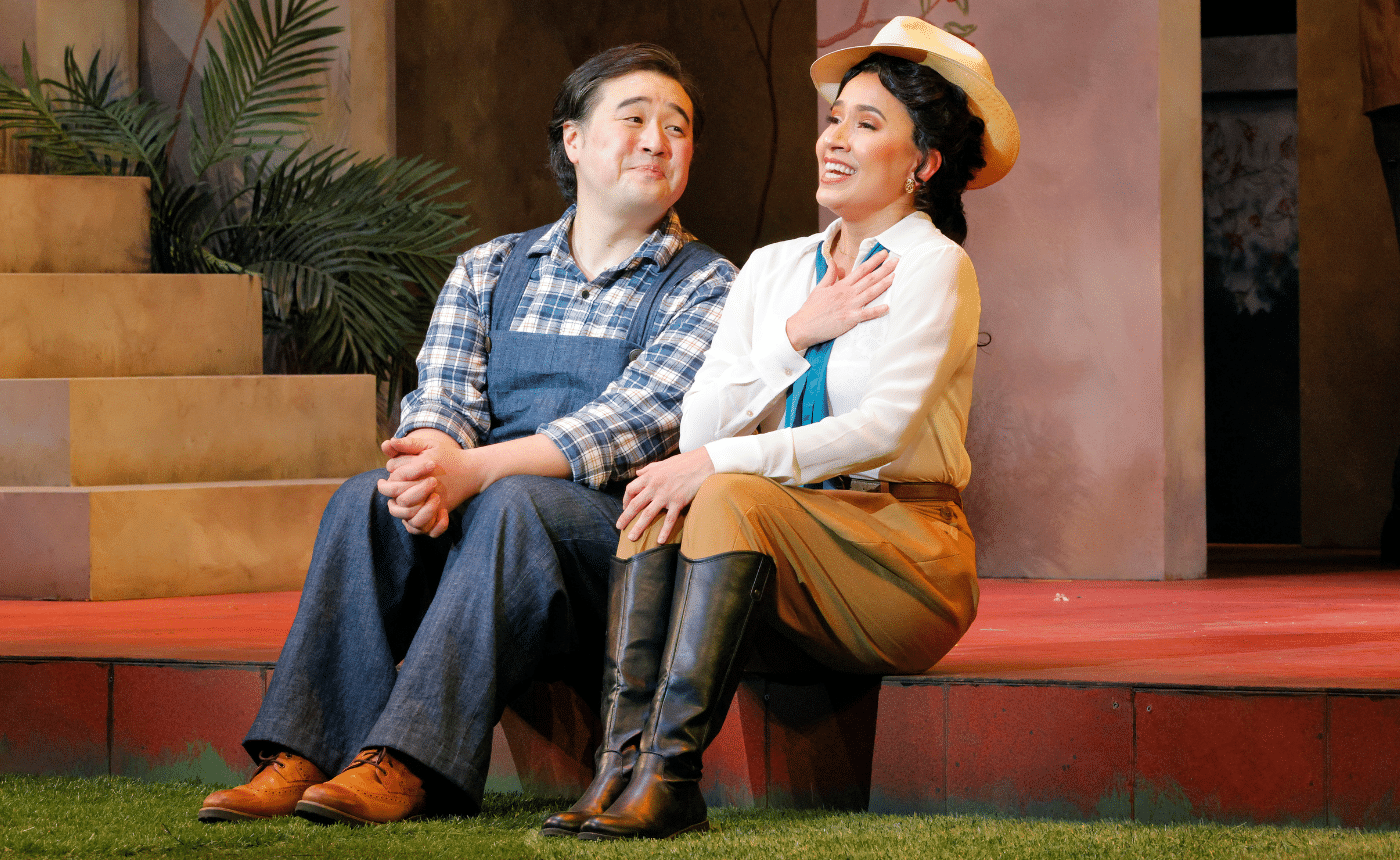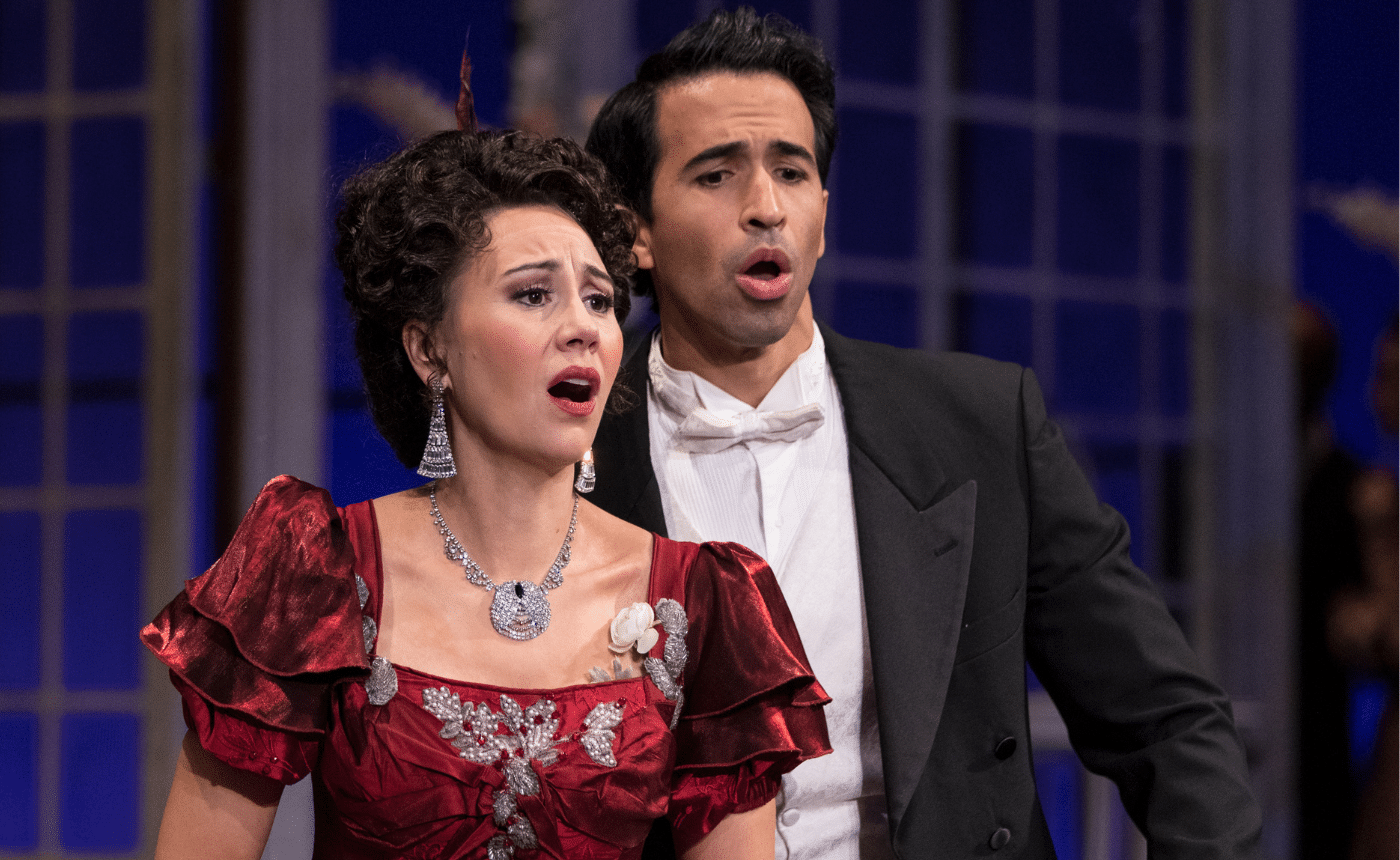The Barber of Seville Online Course by Dr. Paul DorganPart 2: The Musical Story of Act 1 Scene 2
However the scene-change is managed, we are now with Rosina in Bartolo’s house. The third Cavatina. Rosina tells us that she recently heard a voice which wounded her heart: it was Lindoro’s voice, and she is determined to win him. That’s her first paragraph, so let’s examine that. “Una voce poco fa” (A voice just a while ago) rises with very excited short notes; “qui nel cor” (in my heart) slower, descending (sighing?) triplets; “mi risuonò” (resounded in me) shuddering fast notes. Then note the sigh and then the excitedness on “e Lindoro fu che il piagò.” Her determination to win Lindoro is conveyed by her following phrases: a leap up followed by dotted descending rhythms, while its higher repeat and more elaborate descent shows us, by purely vocal means, that Rosina is not some wilting violet of an operatic heroine. 1st Violins now give us a descending, “sighing” figure, which is immediately contradicted by their giggling turns as she tells us that her Guardian’s objections will only make her more crafty in her attempts to calm him; and, of, course, she will win in the end. Flute and Clarinet introduce a more seductive theme, with an echo from 1st violins, but the full orchestra insists on their original opening; 1st violins’ ascending giggles seem to calm everyone down and bring us into the second section of her aria. Again the vocal line expresses the text: some vocal smiling as she tells us she’s “docile,” and when did descending triplets sound so respectful when she says she is? She’s obedient: those following triplets perfectly tell us that she’s a tender lover, though perhaps the sixteenth-note laugh indicates a light-hearted one. “Ma” – Italian for “But…” – if someone tries to control her, watch out! A wonderful musical and vocal depiction of Rosina’s character it is. But four months earlier he had used the same musical ideas for Queen Elizabeth’s opening aria in Elisabetta, Regina d’Inghilterra, his first opera for his new position as Director of Music for the Royal Theatres in Naples, chief of which was the San Carlo which boasted a resident company of excellent singers and a good orchestra; his contract there gave him leaves-of-absence to compose for other Opera Houses: hence the Roman Almaviva/Barbiere.
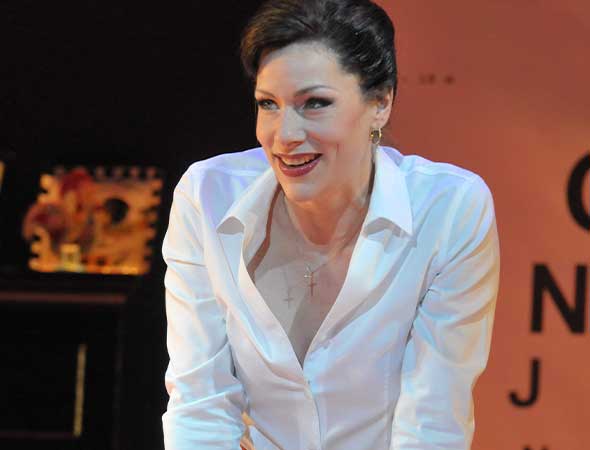
Opera Philadelphia’s production of The Barber of Seville. Rosina (Jennifer Holloway) works for and is the ward to Dr. Bartolo, an ophthalmologist. Photos by Kelly & Massa.
Rosina is sure of herself, but wonders how to deliver the letter she has written to the voice she heard without Bartolo finding out: maybe Figaro had been chatting with him? And here he is! She complains that she might as well be buried alive as be confined in this house, but before that notion can be developed, Bartolo returns and Figaro must hide. He is angry with Figaro’s giving the wrong medications to his servants (see above about a barber providing medical services!); Rosina objects to his objections, and leaves. To find out from his servants if Figaro has been meeting with Rosina Bartolo questions Ambrogio and Berta, but is frustrated by her sneezing and his snoozing. Thank goodness Don Basilio arrives! “I must marry Rosina today!” “Count Almaviva is now in Seville.” “Rosina’s unknown lover?” “Exactly. Give me 3 days and I will have come up with a story which will destroy his reputation.”
In his aria Basilio tells how a slander, at first whispered, can spread until it grows into such a thunder-storm of abuse that the victim can do nothing but surrender to what has become public opinion, and must abandon his quest. First note the slimy 1st violin figure, followed by snickering woodwinds. Then the violins begin a figure which increases in volume as the slander spreads, until the full orchestra plays Fortissimo! It’s a perfect musical depiction of what Basilio is describing, right? But that crescendo-ing figure was re-cycled from a duet in Sigismondo, which premiered a year earlier at Venice’s La Fenice.
Bartolo is delighted with the plan, and they leave to draw up the marriage contract. Figaro emerges from his hiding-place and Rosina returns. He tells her what he’s heard, but she’s more interested in the conversation she heard between Figaro and who-was-it? Improvising: my cousin; a good guy; here to complete his studies; and hopes to do well; but, confidentially, he has a great defect: he’s madly in love. Where does she live? Nearby. Pretty? Very. Her name? Spelling-lesson for non-Italian speakers as they pronounce the individual letters which results in “Rosina”!
In hesitating disbelief Rosina asks Figaro if she really is the beloved; but immediately, she vocally delights in the fact that she already knew she was! Violins, answered by flutes and clarinets, accompany his assurances that indeed Lindoro loves her. She wonders how she might talk to Lindoro? He’ll come here, but he needs some affectionate lines from her: much to-ing and fro-ing about what she should write, until, she produces the already-writen letter, and his astonishment might be tinged with a dab of bitterness that he’s been outwitted! Rosina prides herself in having chosen the right man to fall in love with; her melody is taken from the second part of the Fanny’s aria in Rossini’s first opera, La cambiale di matrimonia , a one-act farce (Venice, 1810). Figaro assures her “He” will soon be with her, and leaves.
Rosina’s delight at the prospect of finally meeting the man she loves is dampened by the return of her guardian who questions her about her conversation with Figaro. He notices her finger is ink-stained; I treated a burn with ink. But one page of note-paper is missing; I used it to write a greeting to Figaro’s daughter. The pen has been sharpened; I drew a flower for my embroidery. In the “noble” key of Eb (think Beethoven’s Eroica Symphony; his Emperor Piano Concerto; and Richard Strauss’s Ein Heldenleben) Bartolo suggests that she should treat a doctor of his standing with more respect. The strings seem to quiver with indignation until they, and the bassoon, explode with Bartolo. He contains his outrage for a few bars, and then sarcasticallly suggests, with support from the flute and clarinet, that she should invent better deceptions, and the rest of the orchestra seems to agree with him. First violins tip-toe a new theme while he goes over her answers, but he’s not having any of it; low strings and winds suggest his suppressed anger as he repeats his question about the missing note-paper. You can’t melt my heart with smiles. Confess, and I’ll forgive you. You’re silent? Then I know what to do, and the orchestra reinforces his words. The strings introduce a very fast, whispery-like figuration which sounds weird because Rossini marks it al ponticello (which means “near the bridge”; the resulting sound is, as one dictionary notes, “glassy”). Over this figuration Bartolo warns his ward that, whenever he leaves the house, she, weeping and despairing, will, to all intents and purposes, be in “lock-down,” and off he storms. Storm away, says Rosina, and lock all the doors and windows: that’s the surest way to sharpen a woman’s brain. And off she goes.
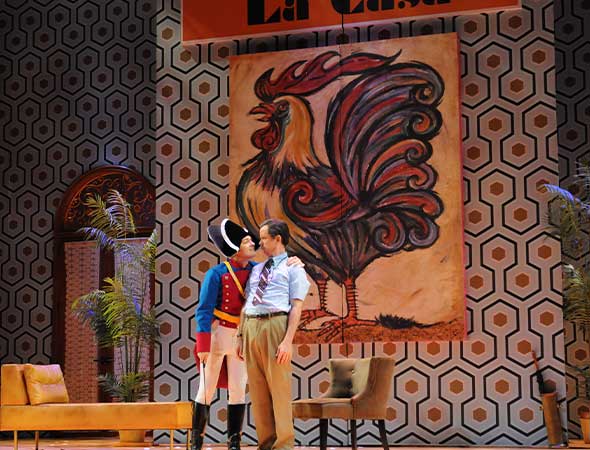
Opera Philadelphia’s production of The Barber of Seville. Almaviva (Taylor Stayton) disguises himself as a drunken soldier to gain access to Bartolo’s (Kevin Budette) house and get close to Rosina. Photos by Kelly & Massa.
The sneezing Berta enters having heard, she presumes, Bartolo arguing, as usual, with Rosina. Thanks to the fortissimo repeated triplet figure on the note C from the full orchestra we, as well as Berta, hear someone knocking at the front door. First violins and solo bassoon introduce a figure in which the oboe joins, which, with its jumps and combinations of dotted rhythms and triplets, could be described as drunken. For it is no other than Almaviva, disguised as a drunken soldier. Bartolo, hearing the racket, enters with the strings voicing his suspicions. What do you want, Mister Soldier? Are you (searching for his orders) Doctor Ballordo? Then maybe Bertoldo? Very commandingly, with the orchestra repeating the opening triplet figure: I’m Doctor Bartolo! Ah, Doctor Barbaro; not much difference in the names! (Where is she, he wonders!) To himself, Bartolo tells himself to be prudent, though he’s quickly losing patience with this obviously drunk soldier. You’re a doctor? Then we must embrace as colleagues (and the libretto tells Almaviva to give Bartolo a “strong” embrace. I’m the horse doctor for the regiment, and they’ve billeted me with you. 1st violins snidely comment.
Now a new musical idea as Almaviva wishes his beloved would appear while Bartolo fumes with rage: note the laughter from the woodwinds! As Almaviva elaborates vocally on his desire to see Rosina, she enters and wonders what the soldier and her guardian can be discussing. Rossini, in combining her voice with his a third apart, tells us that she guesses the real identity of the soldier. Such tight harmony is a standard musical short-cut, telling us that characters are closely connected: listen to the duets between the sisters Fiordiligi and Dorabella in Mozart’s Così fan tutte (1991; 2005; 2015)!
A fortissimo chord from the full orchestra drowns out the start of a pianissimo figure from the 1st violins which will accompany their individual asides: It’s Rosina; he’s looking at me; I’m Lindoro; be careful! Violins grunt Bartolo’s disapproval of Rosina’s interruption and orders her away. Back to that 1st violin figure as Almaviva says she must bring him to his room. More violin grunting as Bartolo claims he’s exempt from accepting billeted soldiers; while he tries to find the document, the lovers’ theme returns as they sing of their feelings. Finally the document is found and with two great unison Ta-DUMs from the full orchestra, Bartolo begins to speak the document’s text. Almaviva will hear nothing of the document (more of Bartolo’s violin grunting, while winds and horns seem nervous about what’s just happened). I’ve been assigned to this house, and here I will stay! Accompanied by the strings, Bartolo threatens to drive the soldier from his house with a stick.
Almaviva is all for a duel; in explaining how the battle will be fought, he drops a letter and tells Rosina to cover it with her handkerchief. Bartolo notices and demands to see it: Rosina, switching papers, says it’s just the laundry list (that snide violin figure returns) and so it proves to be to the great astonishment of the orchestra on a sustained C (where we began!) Berta re-enters (maybe to announce the return of Basilio?) and wonders what’s going on. Basilio seems to be there to give a voice lesson to Rosina, for he’s doing vocal warm-ups on the bass-notes of the harmony, singing their “do-re-mi” names, and if you don’t know those technical terms, watch The Sound of Music in which Julie Andrews translates them into easily-recognizable homophones; unfortunately Rossini’s musical joke exists only on the page: it’s lost in performance.
Berta’s return, though, brings back two earlier-heard themes. OMG! Could this whole chunk of the Act 1 Finale of an Italian comic opera actually be in sonata-form (where themes are introduced, developed and then brought back): that most classical of all musical structures for Haydn, Mozart, and Beethoven? Let’s see what happens after the full orchestra firmly re-establishes the opening C. Sad C minor say the strings, as the oboe sings a sobbing theme depicting Rosina’s miserable existence in this house. Bartolo tries to comfort her, but Almaviva threatens him to such a degree that the others in the room are very concerned. Opportunely, and to a variant of the opening triplet figure, Figaro enters and wonders what is going on, since the racket inside has attracted the citizens outside. The rivals condemn each other, despite Figaro’s aside to the Count to be careful, and everyone begs for silence.
“A violent knocking is heard at the front door” says the stage-direction. Silence. Who, they all wonder, could it be? Silence. The police; let us in! Quietly cursing such an arrival they, one after another, wonder how it will all end. These staggered entries constitute what’s known as a “canon” , beloved of Bach and his contemporaries. In using such a “Baroque” form, is Rossini reaching further back into history in order to show the “scholars” he’s absorbed his compositional heritage? The real point, though, is that it perfectly illustrates, musically, their uncertainty, and the wandering solo flute does nothing to assuage their anxiety. A brusque sweeping figure from the strings and bassoon ushers in an Official and his soldiers who tells everyone to freeze and explain what’s going on. Another canon-like moment as each of the men tells his side of the story, Vivace and essentially unaccompanied; the ladies soon add their opinions and are briefly joined by violins and violas. On the basis of the presented evidence (really, could he understand what they were telling him?) the Officer arrests Lindoro.
The full orchestra is shocked into Ab major (from C major) when Lindoro shows the Officer a letter, who, on reading it bows and signs his soldiers to hold off on the arrest. Plucked strings are hesitant, though the flute, with its more legato phrase, seems to know more than the rest of them. In the first-act finales of Rossini’s comic operas there is a moment when, for some reason, the characters are stunned into silence; but, since this is opera, they sing about it. Here, led off by Rosina, they are as frozen as statues; canonically Almaviva (un-frozen) repeats her music but alters her text to refer to Bartolo who, in turn, enters with Rosina’s text. Figaro, also un-frozen, sings a new theme, laughing at Bartolo’s statue-like stunnedness.
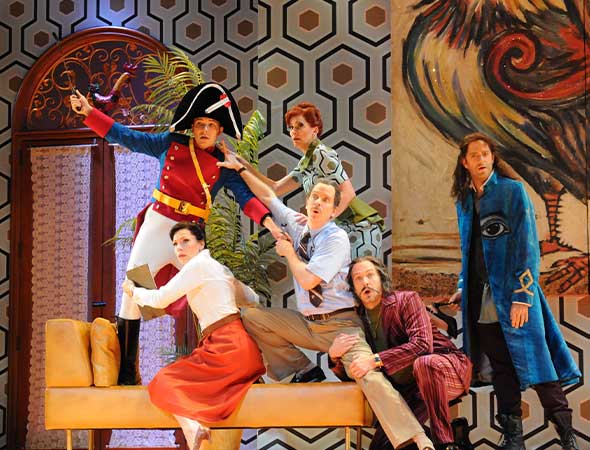
Opera Philadelphia’s production of The Barber of Seville. Hijinks at the end of Act I featuring, clockwise from top left, Almaviva (Taylor Stayton), Berta (Katrina Thurman), Figaro (Jonathan Beyer), Don Basilio (Wayne Tigges), Dr. Bartolo (Kevin Burdette), and Rosina (Jennifer Holloway). Photos by Kelly & Massa.
Strings takes us back to the opening key of C major and a brisk tempo. Woodwinds laugh as Bartolo, Basilio and Berta try to explain, but the soldiers tell them to shut up and act normally, to which they agree, with the exception of Bartolo. Musically a wonderful build-up to a dominant 7th chord on G which leads us into the wonderful final section of this wonderful finale which ends this wonderful 1st Act. I doubt you’ll hear the busy triplets of the violins, but I’m sure you’ll finally hear that mysterious Sistro on the last beat of every bar. Another feature of the Act 1 finales of Rossini’s comic operas is that, besides being frozen like statues, their brains are somehow disturbed. Listen for the moment of silence followed by the soldiers bringing us from C major into the “disturbed” key of Eb major, but then hear how Rossini slides us back into the “home” tonality. Then he begins one of his “getting louder” moments, and what’s amazing about that is, having reached greatest loudness, he’s able to return it to softness and begin all over again and somehow make it seem more exciting to us audiences. Pure genius! If he’d never composed a note of the second act of Barbiere we’d acknowledge Rossini’s genius. But he did, so let’s move on to that.



